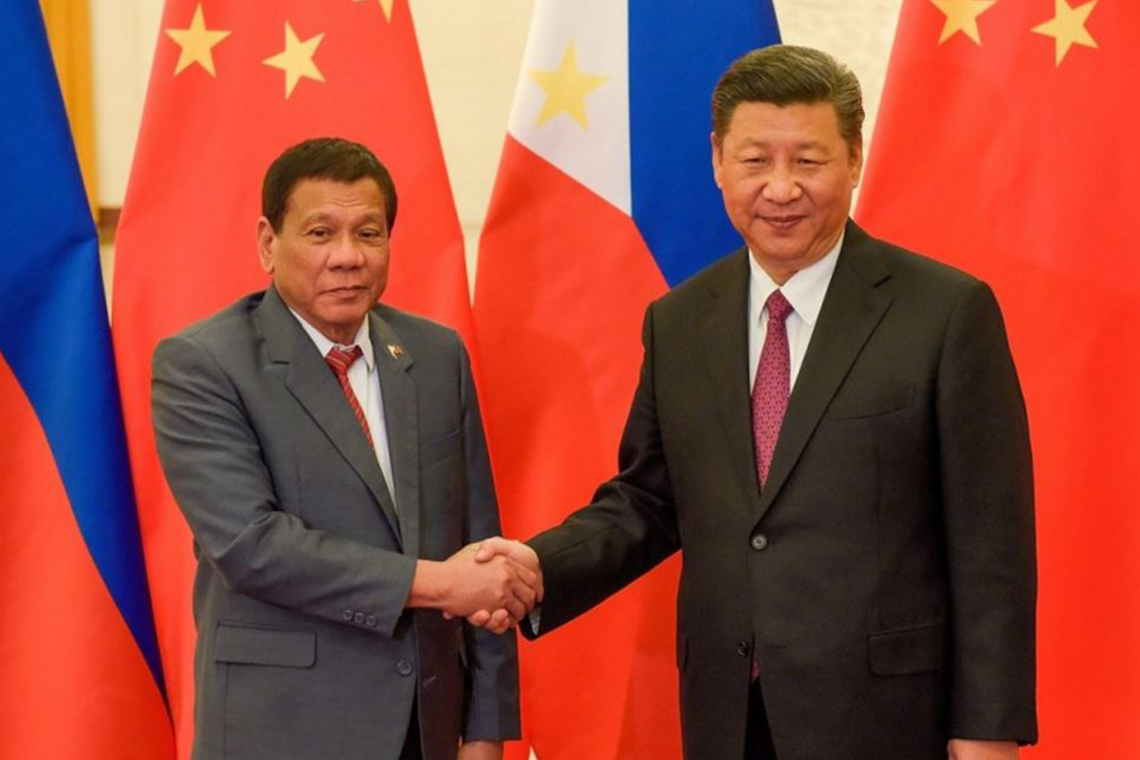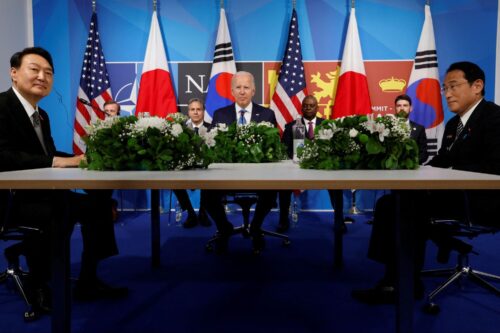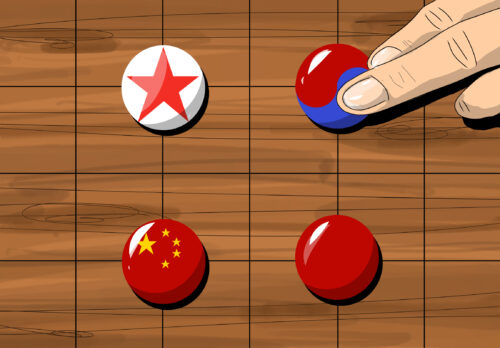Duterte says Xi Jinping warns of war if Philippines drills for oil
A roundup of the top China news for May 19, 2017. Get this free daily digest delivered to your inbox by signing up at supchina.com/subscribe.

Duterte says Xi Jinping warns of war if Philippines drills for oil
The South China Morning Post reports that “Philippine President Rodrigo Duterte said on Friday Chinese counterpart Xi Jinping had warned him there would be war if Manila tried to enforce an arbitration ruling and drill for oil in a disputed part of the South China Sea.” In a speech, Duterte said that he has told Xi in a meeting on May 15 that he intends to drill for oil “because it is ours,” but that Xi responded by saying, “We’re friends, we don’t want to quarrel with you, we want to maintain the presence of warm relationship, but if you force the issue, we’ll go to war.”
Chinese jets buzz U.S. radiation detection plane
The two Chinese Su-30 jets flew within 150 feet of the U.S. radiation detection plane during the confrontation over the Yellow Sea. “The issue is being addressed with China through appropriate diplomatic and military channels,” said Air Force spokeswoman Lieutenant Colonel Lori Hodge, according to the Daily Telegraph.
Chinese people are forgetting how to write Chinese characters
Computers and mobile phones are rendering writing with a pen obsolete all over the world, but in China, the change may be obvious because of the difficulty of writing Chinese characters. Language Log, an excellent blog written by linguists and curious people, gives an example of the effects of “character amnesia” with a screenshot of a shopping list (written by a Chinese Academy of Social Sciences researcher with a Ph.D.) that uses pinyin — the People’s Republic’s standardized romanization system — for three characters because the writer could not remember how to write them.
Feed me
As always, I appreciate your feedback. Just hit reply to tell me what you think of our work. Have a great weekend!
—Jeremy Goldkorn, Editor-in-Chief
Viral video Friday
Jia Guo presents videos that went viral in China, May 15-19. Russian President Vladimir Putin tickles the ivories; police officers perform heartwarming acts; and a poodle gets perky.
This week on The China Project:
Sinica Podcast: Joseph Nye: Chinese power in the age of Donald Trump
Video: The American Dream through the eyes of Chinese millennials
This week’s news roundups are:
May 15: Cyber attacks in China and a Belt and Road rap song
May 16: China’s plan for Pakistan, and drone registration
May 17: Belt and Road protests, plus online healthcare rules
May 18: Dog meat reportedly banned at infamous festival
This issue of the The China Project newsletter was produced by Sky Canaves, Lucas Niewenhuis, Jia Guo, and Jiayun Feng. More China stories worth your time are curated below, with the most important ones at the top of each section.
BUSINESS AND TECHNOLOGY:
China’s commodity exchanges to open to foreign investors
Once a strictly regulated market only reserved for domestic investors, China’s commodity exchanges are gradually opening up to foreigners as part of an effort to increase the influence of the yuan — global benchmarks on commodities are still mostly priced in dollars. In addition to the expansion of investments permitted for foreign investors, Chinese exchange operators also plan to add futures contracts for key raw materials, including apples and cotton yarn, as well as options on copper and corn, according to Bloomberg.
Progress has been slow this year. In March, Dalian published a hog-price index, indicating a start of trading in related futures. In early April, Zhengzhou Commodities Exchange said that it had finished a draft contract design for apple futures. However, breakthroughs on real changes are rare, as the China Securities Regulatory Commission has yet to approve any new futures contracts.
- A $60 billion ecommerce loophole in China may be narrowing / Bloomberg
“Known as cross-border e-commerce, the booming backdoor avenue allows Chinese consumers to buy overseas-manufactured goods online and effectively circumvent the regulatory issues that have stymied access to consumer products from cosmetics to Cognac. Faced with pressure from conventional retailers at home, and the loss of tax revenue, the government is now looking at overhauling the legal loophole.”
- Amid industry pushback, China offers changes to cyber rules: sources / Reuters
“China may delay full implementation of controversial new cyber security rules, giving companies more time to prepare, two people who attended a meeting on Friday between the country’s internet regulator, businesses and diplomats told Reuters.” - China claims breakthrough in mining ‘flammable ice’ / BBC
“China has for the first time extracted gas from an ice-like substance under the South China Sea considered key to future global energy supply.” - China’s mid-sized cities are enjoying a property boom / The Economist (paywall)
- China’s investments in the U.S. are setting off a clash of statistics / Quartz
- After ‘The Great Wall,’ can China-Hollywood co-productions be saved? / Hollywood Reporter
POLITICS AND CURRENT AFFAIRS:
Xi Jinping wants to reset relations with South Korea
During a meeting with former South Korean prime minister Lee Hae-chan on May 18, Chinese President Xi Jinping said that China is ready to work with South Korea to bring bilateral relations back on track, following months of tensions over the deployment of THAAD, a U.S. missile defense system that is intended to guard against threats from North Korea but that the Chinese government sees as a threat.
In Chinese state media reporting of Xi’s meeting with Lee, the Chinese president emphasized the goal of denuclearizing the Korean Peninsula and said that China is willing to improve communication with the new government of South Korea on many issues.
Lee was dispatched by South Korea’s newly elected president, Moon Jae-in, to China in an attempt to keep communications open between the two countries “at a critical time.” State media Ecns.cn said that Lee affirmed that South Korea understood China’s major concerns and would cooperate with China to remove any obstacles that hinder the development of bilateral ties.
Since Moon Jae-in took office on May 10, signs have emerged that Beijing and Seoul are seeking to reconcile their differences and repair damaged relations caused by the THAAD dispute. Shortly after the election last week, Xi called the new South Korean leader to congratulate him on his victory. In return, Moon’s sending of Lee Hae-chan as a special envoy to China is another sign of both countries’ intentions to build bridges.
- China, ASEAN agree on framework for South China Sea code of conduct / Reuters
On May 18, China and Southeast Asian countries agreed to draft a code of conduct for the disputed South China Sea, China’s foreign ministry said. - A year in office, Taiwan’s Tsai seeks Beijing’s goodwill to help curb anti-China sentiment / Reuters
From taking to Twitter to talk about Taiwan being excluded from a UN health meeting to making her first extensive comments on the detention of Taiwan activists in China, Taiwan President Tsai Ing-wen 蔡英文 intends to “give Beijing a roadmap on where ‘goodwill’ can be extended and in turn give her a chance to reciprocate.” - What Belt and Road snub means for Singapore’s ties with China / SCMP
- China-Hong Kong bridge to unity, or tentacle of Beijing control? / Reuters
- China’s ‘war on law’: Victims’ wives tell U.S. Congress of torture and trauma / The Guardian
- In a Chinese courtroom, faint promises of justice / The Globe and Mail
SOCIETY AND CULTURE:
No kissing, please, we’re in Shandong
A college in Shandong Province has been at the center of controversy on Chinese social media for launching a campaign against public demonstrations of affection among student couples and other “uncivilized behaviors.” It features photos of students holding hands, kissing, and cuddling, as well as photos of students smoking, drinking, and raising pets on campus. At the top of the display boards are regulations made by the school authorities, which say (in Chinese), “Students who hug or kiss in public areas on campus will be given disciplinary warnings or punishments.”
The campaign has drawn a barrage of criticism (in Chinese) on the Chinese social media platform Weibo, with many internet users questioning why college students being in a relationship and showing some affection is regarded as “uncivilized.” One commenter wrote, “Since students are forbidden to do these uncivilized behaviors on campus, is this school forcing them to get a hotel room?” However, despite the online backlash, the school said that it would continue its exposure because “there are related documents from the Ministry of Education to abide by.”
The school’s crackdown on student couples runs against the message sent from He Junke 贺军科, one of the top officials in the Communist Youth League (CYL). In a press conference on May 17, He said that “getting married is the biggest problem among young people.” “For those who attend college, they graduate in their twenties and tend to marry late after having some accomplishments in their jobs,” He said (in Chinese). “Therefore, the CYL needs to help young people find their partners.”
- For millions of Chinese with rare diseases, some relief in sight / Reuters
“China is set to publish its first national list of rare diseases, to guide policymakers as part of a broader overhaul to improve diagnoses and speed up drug approvals in the world’s second-largest drugs market.” - A Chinese genome giant sets its sights on the ultimate sequencer / Wired
- The wider meaning of change in a Beijing alleyway / The Economist
- Goodbye, Dali: Hip tourist spot turns into ghost town as sewage scare prompts shutdown / Caixin
- Conservation at major historic site suspended after workers found to be using ‘barbarian methods’ / Caixin
- China World Cup bid only a matter of time, says country’s new man in football’s corridors of power / SCMP





